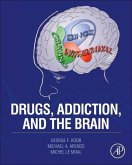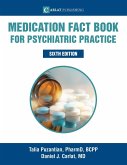Joseph R. Volpicelli, Helen M. Pettinati, A. Thomas McLellan
Combining Medication and Psychosocial Treatments for Addictions: The Brenda Approach
Joseph R. Volpicelli, Helen M. Pettinati, A. Thomas McLellan
Combining Medication and Psychosocial Treatments for Addictions: The Brenda Approach
- Gebundenes Buch
- Merkliste
- Auf die Merkliste
- Bewerten Bewerten
- Teilen
- Produkt teilen
- Produkterinnerung
- Produkterinnerung
For use by addiction counselors, psychologists, psychiatrists, and other professionals working with clients with addictions, this work provides a supported framework for managing biophysical treatment of alcohol and drug dependence. Compatible with cognitive-behavioral and 12-step models, BRENDA is a collaborative, case-management approach to treatment that has been demonstrated effective in more than 80 percent of alcohol-dependent referrals.
Andere Kunden interessierten sich auch für
![Combined Treatments for Mental Disorders: A Guide to Psychological and Pharmacological Interventions Combined Treatments for Mental Disorders: A Guide to Psychological and Pharmacological Interventions]() American Psychological AssociationCombined Treatments for Mental Disorders: A Guide to Psychological and Pharmacological Interventions28,99 €
American Psychological AssociationCombined Treatments for Mental Disorders: A Guide to Psychological and Pharmacological Interventions28,99 €![Drugs, Addiction, and the Brain Drugs, Addiction, and the Brain]() George F. KoobDrugs, Addiction, and the Brain104,99 €
George F. KoobDrugs, Addiction, and the Brain104,99 €![Evidence-Based Treatments for Alcohol and Drug Abuse Evidence-Based Treatments for Alcohol and Drug Abuse]() Paul M G EmmelkampEvidence-Based Treatments for Alcohol and Drug Abuse187,99 €
Paul M G EmmelkampEvidence-Based Treatments for Alcohol and Drug Abuse187,99 €![Medication Fact Book for Psychiatric Practice Medication Fact Book for Psychiatric Practice]() Talia PuzantianMedication Fact Book for Psychiatric Practice98,99 €
Talia PuzantianMedication Fact Book for Psychiatric Practice98,99 €![The Match: Academic/Applied Psychology and the Chemical Dependence Field: A Parallel History of Theory, Assessment, and Treatment The Match: Academic/Applied Psychology and the Chemical Dependence Field: A Parallel History of Theory, Assessment, and Treatment]() Alfred A. BorrelliThe Match: Academic/Applied Psychology and the Chemical Dependence Field: A Parallel History of Theory, Assessment, and Treatment34,99 €
Alfred A. BorrelliThe Match: Academic/Applied Psychology and the Chemical Dependence Field: A Parallel History of Theory, Assessment, and Treatment34,99 €![The Bitterest Pills The Bitterest Pills]() J. MoncrieffThe Bitterest Pills77,99 €
J. MoncrieffThe Bitterest Pills77,99 €![The Psychotherapist's Guide to Psychopharmacology The Psychotherapist's Guide to Psychopharmacology]() Michael J. GitlinThe Psychotherapist's Guide to Psychopharmacology43,99 €
Michael J. GitlinThe Psychotherapist's Guide to Psychopharmacology43,99 €-
-
For use by addiction counselors, psychologists, psychiatrists, and other professionals working with clients with addictions, this work provides a supported framework for managing biophysical treatment of alcohol and drug dependence. Compatible with cognitive-behavioral and 12-step models, BRENDA is a collaborative, case-management approach to treatment that has been demonstrated effective in more than 80 percent of alcohol-dependent referrals.
Produktdetails
- Produktdetails
- Verlag: Guilford Publications
- New
- Seitenzahl: 208
- Erscheinungstermin: März 2001
- Englisch
- Abmessung: 234mm x 157mm x 20mm
- Gewicht: 445g
- ISBN-13: 9781572306189
- ISBN-10: 1572306181
- Artikelnr.: 21418996
- Herstellerkennzeichnung
- Libri GmbH
- Europaallee 1
- 36244 Bad Hersfeld
- gpsr@libri.de
- Verlag: Guilford Publications
- New
- Seitenzahl: 208
- Erscheinungstermin: März 2001
- Englisch
- Abmessung: 234mm x 157mm x 20mm
- Gewicht: 445g
- ISBN-13: 9781572306189
- ISBN-10: 1572306181
- Artikelnr.: 21418996
- Herstellerkennzeichnung
- Libri GmbH
- Europaallee 1
- 36244 Bad Hersfeld
- gpsr@libri.de
Joseph R. Volpicelli, MD, PhD, Associate Professor and Senior Scientist, University of Pennsylvania Helen M. Pettinati, PhD, Associate Professor, Department of Psychiatry, Treatment Research Center, University of Pennsylvania A. Thomas McLellan, PhD, Senior Scientist, Treatment Research Institute, Philadelphia, PA Charles P. O'Brien, MD, PhD, Treatment Research Center, University of Pennsylvania
I. The BRENDA Approach and How to Use It
1. The Biopsychosocial Understanding of Addiction
2. Managing Addiction Treatment Using the BRENDA Approach
3. Biopsychosocial Assessment: How to Conduct It
4. The Report: How to Prepare and Present the Assessment Results
5. Empathetic Understanding: Listening to the Patient
6. Needs: Indentifying Patient Needs and Priorities
7. Direct Advice: Matching Needs to Treatment Options
8. Assessment of the Patient's Reaction to Advice: Adjusting Advice to
Patient Response
9. Dealing with Pharmacotherapy and Medication Compliance Issues
10. Applying the BRENDA Stages to Early Recovery Issues
11. Applying the BRENDA Stages to Later Recovery Issues
II. The BRENDA Approach in Action
12. The Case of Bill: A Successful Businessman with Alcohol Addiction
13. The Case of Alissa: Cocaine and Alcohol Addiction with Severe
Psychosocial Complications
14. The Case of Stephen: A Binge Drinker/Precontemplator
APPENDIX A: Instruments
Cage Questionnaire
Alcohol Use Disorders Identification Test (AUDIT)
Substance Use Disorders Screen
Psychological Distress Inventory--32 (PDI-32)
APPENDIX B: Naltrexone Pharmacotherapy for Alcohol Dependence
Dosage and Administration
Pharmacokinetics/Mechanism of Action
Drug Interaction Precautions
Side Effects
Contraindications
Patients' Frequently Asked Questions about Naltrexone
Medication Tips for Patients
1. The Biopsychosocial Understanding of Addiction
2. Managing Addiction Treatment Using the BRENDA Approach
3. Biopsychosocial Assessment: How to Conduct It
4. The Report: How to Prepare and Present the Assessment Results
5. Empathetic Understanding: Listening to the Patient
6. Needs: Indentifying Patient Needs and Priorities
7. Direct Advice: Matching Needs to Treatment Options
8. Assessment of the Patient's Reaction to Advice: Adjusting Advice to
Patient Response
9. Dealing with Pharmacotherapy and Medication Compliance Issues
10. Applying the BRENDA Stages to Early Recovery Issues
11. Applying the BRENDA Stages to Later Recovery Issues
II. The BRENDA Approach in Action
12. The Case of Bill: A Successful Businessman with Alcohol Addiction
13. The Case of Alissa: Cocaine and Alcohol Addiction with Severe
Psychosocial Complications
14. The Case of Stephen: A Binge Drinker/Precontemplator
APPENDIX A: Instruments
Cage Questionnaire
Alcohol Use Disorders Identification Test (AUDIT)
Substance Use Disorders Screen
Psychological Distress Inventory--32 (PDI-32)
APPENDIX B: Naltrexone Pharmacotherapy for Alcohol Dependence
Dosage and Administration
Pharmacokinetics/Mechanism of Action
Drug Interaction Precautions
Side Effects
Contraindications
Patients' Frequently Asked Questions about Naltrexone
Medication Tips for Patients
I. The BRENDA Approach and How to Use It
1. The Biopsychosocial Understanding of Addiction
2. Managing Addiction Treatment Using the BRENDA Approach
3. Biopsychosocial Assessment: How to Conduct It
4. The Report: How to Prepare and Present the Assessment Results
5. Empathetic Understanding: Listening to the Patient
6. Needs: Indentifying Patient Needs and Priorities
7. Direct Advice: Matching Needs to Treatment Options
8. Assessment of the Patient's Reaction to Advice: Adjusting Advice to
Patient Response
9. Dealing with Pharmacotherapy and Medication Compliance Issues
10. Applying the BRENDA Stages to Early Recovery Issues
11. Applying the BRENDA Stages to Later Recovery Issues
II. The BRENDA Approach in Action
12. The Case of Bill: A Successful Businessman with Alcohol Addiction
13. The Case of Alissa: Cocaine and Alcohol Addiction with Severe
Psychosocial Complications
14. The Case of Stephen: A Binge Drinker/Precontemplator
APPENDIX A: Instruments
Cage Questionnaire
Alcohol Use Disorders Identification Test (AUDIT)
Substance Use Disorders Screen
Psychological Distress Inventory--32 (PDI-32)
APPENDIX B: Naltrexone Pharmacotherapy for Alcohol Dependence
Dosage and Administration
Pharmacokinetics/Mechanism of Action
Drug Interaction Precautions
Side Effects
Contraindications
Patients' Frequently Asked Questions about Naltrexone
Medication Tips for Patients
1. The Biopsychosocial Understanding of Addiction
2. Managing Addiction Treatment Using the BRENDA Approach
3. Biopsychosocial Assessment: How to Conduct It
4. The Report: How to Prepare and Present the Assessment Results
5. Empathetic Understanding: Listening to the Patient
6. Needs: Indentifying Patient Needs and Priorities
7. Direct Advice: Matching Needs to Treatment Options
8. Assessment of the Patient's Reaction to Advice: Adjusting Advice to
Patient Response
9. Dealing with Pharmacotherapy and Medication Compliance Issues
10. Applying the BRENDA Stages to Early Recovery Issues
11. Applying the BRENDA Stages to Later Recovery Issues
II. The BRENDA Approach in Action
12. The Case of Bill: A Successful Businessman with Alcohol Addiction
13. The Case of Alissa: Cocaine and Alcohol Addiction with Severe
Psychosocial Complications
14. The Case of Stephen: A Binge Drinker/Precontemplator
APPENDIX A: Instruments
Cage Questionnaire
Alcohol Use Disorders Identification Test (AUDIT)
Substance Use Disorders Screen
Psychological Distress Inventory--32 (PDI-32)
APPENDIX B: Naltrexone Pharmacotherapy for Alcohol Dependence
Dosage and Administration
Pharmacokinetics/Mechanism of Action
Drug Interaction Precautions
Side Effects
Contraindications
Patients' Frequently Asked Questions about Naltrexone
Medication Tips for Patients








